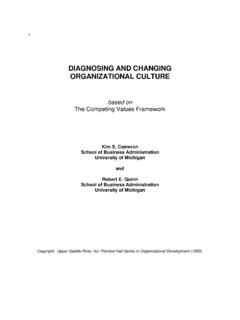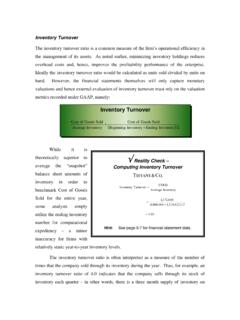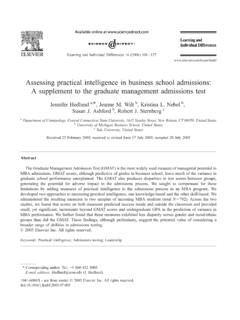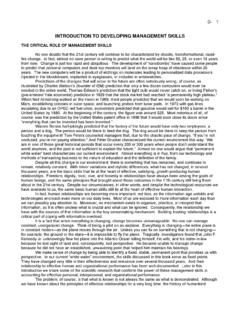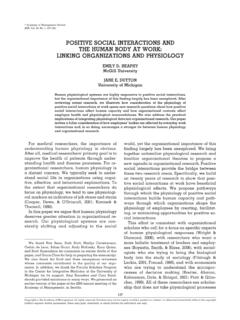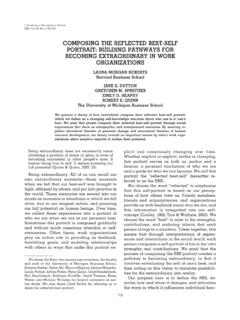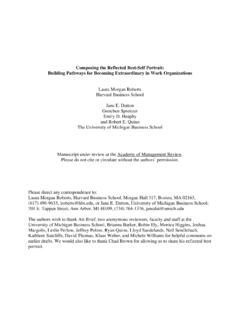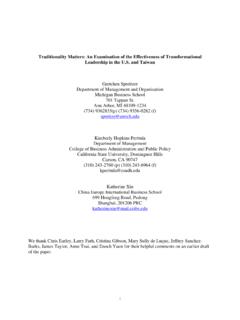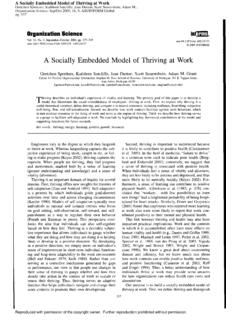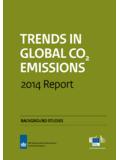Transcription of Developing as a leader: The power of mindful …
1 Developing as a leader: The power of mindful engagementSusan J. Ashford, D. Scott DeRueOrganizations around the world are faced with a multitude ofeconomic, social, ethical, and geo-political challenges. Theuncertainty of the current economic crisis is limiting growthand innovation across market sectors. The globalization ofinternational trade has created more complex and interde-pendent flows of people, goods, funds, and technology acrossnational boundaries. More people than not lack access toquality education, employment, healthcare, and clean is a current reality for over one-third of the world. At atime when the status quo is unsustainable and a new normal is required, the need for exceptional leadership at all levels oforganizations has never been greater. Leadership enablesorganizations to see opportunities on the horizon, developstructures to motivate action, and inspire people of all stripesto pursue opportunities with courage, passion and an immense need for exceptional leadership,there is a leadership talent crisis brewing that spans nationalboundaries and market sectors.
2 World-wide surveys of seniorexecutives and human resource professionals indicate thatup to 70% of North American employers experience a dearthof leadership talent that is and will continue to impedeorganizational performance. In Asia, the problem is evenworse, with 88% of organizations indicating concern abouta looming shortage of leadership talent. Market sectors suchas non-profit and social enterprise are experiencing leader-ship deficits that significantly constrain their ability to meetthe needs of their constituencies. Unfortunately, as the babyboomer population retires, this talent shortage will escalateeven further, as organizations are projected to lose up to 50%of their senior leadership personnel. Indeed, the need forleadership is real and surpasses organizations current abilityto develop leadership OF THE LEADERSHIP TALENT CRISISThe leadership talent crisis is emerging despite organizationsdevoting considerable resources to leadership 2010, organizations invested $12 billion inleadership development programs and activities, and asthe global economy begins to recover, these investmentsare expected to increase.
3 The origin of the problem is nota lack of investment in leadership development. We submitthat the leadership deficit originates from two fundamentalassumptions that organizations make about leadership andleadership , organizations and their members routinely confusethe term leader with people who hold a supervisory posi-tion or leader-like job title. However, leadership is aboutinfluencing people and processes in service of accomplishinga collective aim or group goal. Such influence can be per-formed by any member of a group, division, or is also true that people who are formally charged withsupervisory responsibilities sometimes (some would sayoften) fail to exhibit effective leadership. This depictionof leadership is consistent with our colleague Bob Quinn snotion that leadership is a fundamental state that individualscan enter and exit. When they are in the state, they arefocused on collective needs and goals (as opposed to personalcomfort) and intent on influencing the collective towardscreating particular results that benefit the whole.
4 This senseof leadership is also consistent with a growing chorus ofacademics and practitioners interested in understandingthe leadership potential of people at all levels of organiza-tions, whether they formally hold supervisory roles or second limiting assumption is that leadership devel-opment is the responsibility of organizations, not , current best practices focus on how organizationsdesign and deploy effective leadership development pro-grams and experiences, and organizations such as GeneralElectric Co. (GE) and IBM are routinely ranked and praisedbased on their ability to develop systems and structuresthat cultivate leadership talent. Likewise, senior managersare often portrayed as responsible for identifying and nurtur-ing high-potential, leadership talent. Yet, nowhere in thisOrganizational Dynamics (2012) 41, 146 154 Available online at ur n al h o mep ag e: www .elsevier .co m /loc ate/o r gd yn0090-2616/$ see front matter # 2012 Elsevier Inc.
5 All rights is the individual s responsibility for taking owner-ship over his or her own development as a leader. To illus-trate, consider the fact that leadership developmentprograms customarily teach leadership concepts and skills,but rarely do development programs teach individuals how tolearn leadership which is ironic considering that over 70% ofleadership development occurs as people go through the upsand downs of challenging, developmental experiences on thejob. We contend that the return on investment in leadershipdevelopment would be much greater if organizationsinvested in Developing individuals skills related to the learn-ing of leadership from lived experiences, as opposed tosimply teaching leadership concepts, frameworks, and DEVELOPMENT: A POSAPPROACHP ositive organizational scholarship (POS), with its emphasison human strengths, capabilities, and agency, offers a novelway of thinking about leadership development that is free ofthese limiting assumptions.
6 A POS perspective on leadershipdevelopment suggests that if organizations are to prosper inenvironments characterized by growing uncertainty andrapid change, they need to enable people across all levelsof the organization to not only have the skills to lead effec-tively, but also see themselves as leaders and be seen byothers as leaders . Indeed, thinking about leadership as anidentity or state of mind that anyone can enter into appro-priately separates leadership from formal supervision, andpermits leadership to emerge at all levels of , a positive identity as a leader might just be the key tounlocking the leadership potential of people who are notdesignated as formal leaders , and enabling these people tostep up and take on leadership roles when the need forleadership POS perspective on leadership development also sug-gests that people can develop the courage, fortitude, andskill set necessary for taking responsibility for their ownleadership development, and more important, that thelearning and development that occurs might be greater whenthey do.
7 This emphasis on personal agency in the leadershipdevelopment process fits well with the contemporary labormarket. The idea that individuals must wait to be noticed anddeemed worthy of development for example, to beselected for a formal, high-potential program where theygain access to unique developmental opportunities is anantiquated point of view. In the current labor market, peopleno longer stay in one organization for their careers and assuch, they have a motive to develop themselves as identity of leader is such a positively-valued onewithin most organizations that being seen as an effectiveleader enhances individuals career mobility both within andbeyond their current organization. For these reasons, peopleneed to be proactive with respect to their own need to take responsibility for their own developmentby learning how to learn leadership from their own this article, we first describe how individuals, throughtheir actions and interactions with other people, developa positive identity as a leader.
8 Leader identity is both aprecursor to and motivator of leadership development. Amethodology for how individuals can take advantage of themost powerful source of leadership development there is their own lived experiences is detailed. Following MorganMcCall s groundbreaking research on first-hand, lived experi-ences as an influential teacher of leadership, scholarshave articulated the strategies and tactics that organizationscan use to leverage the power of experience in leadershipdevelopment. Although we fully endorse the important roleorganizations play in creating developmental experiencesand supporting the learning process, our emphasis is differ-ent. Grounded in POS themes of human agency and potential,we present a methodology called mindful engagement that moves individuals from passively waiting and hoping tobe developed to active learners and architects of theirown leadership development. The mindful engagement pro-cess explains how individuals can approach, engage in, andreflect on their lived experiences in ways that promotelearning and increase the developmental punch of to traditional perspectives on leadership devel-opment, our focus on Developing a positive leader identityand mindfully engaging in developmental experiences hasseveral advantages.
9 First, we portray leadership develop-ment as a process that is available to anyone and that cantake place at all levels of organizations. This perspectiveinvites more people into the leadership development pro-cess, and as a result, should help organizations address thecurrent leadership talent deficit. Second, our perspectiveemphasizes that leadership development is not somethingthat starts and stops according to an organization s agenda for example, when the organization decides an individual isready for a particular training program or developmentalassignment. Rather, leadership development is an ongoingprocess where individuals take initiative and, through theirown agency and action, capitalize on the developmentalvalue of the full range of life experiences. Finally, organiza-tions can leverage our model and research to complementtheir existing leadership development methods andapproaches by creating conditions that encourage individualsto actively take part in and enhance the value of leadershipdevelopment THE LEADER WITHINAs human beings, we can envision many different possibleselves for who we are and the roles that we play in might include possible selves that we feel we ought tobe, selves that we ideally want to be, or selves that we barelydare to dream about being.
10 Our identity, or how we think ofourselves, is comprised of these possible selves and theactual roles we play and ways we are. For example, one sidentity might include roles such as father or mentor ,attributes such as intellectual or loyal friend, or socialgroups that we see ourselves belonging to such as women or racial minority. These identities become key sources ofmotivation and strongly influence our attitudes, ways ofthinking, and research suggests that seeing oneself as a leader orhaving leader as a core part of one s identity, is animportant precursor to taking on leadership roles and enga-ging in actions to further develop one s capacity for effectiveLessons for leadership development 147leadership. People who see themselves as leaders , or at leastsee leader as a possible self, are more likely to seek outopportunities to exhibit leadership as well as further developtheir leadership capabilities.
